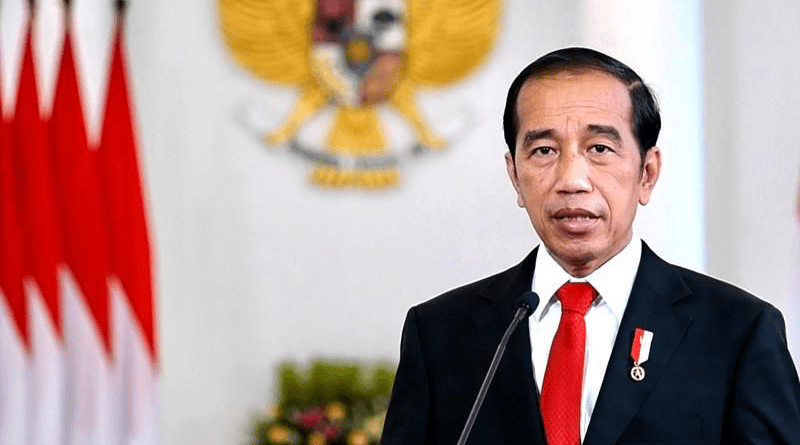How A Chinese Railway Helped Jokowi Cement His Infrastructure Legacy – Analysis
By Menghu Xia
Indonesia welcomed its first high-speed railway in October 2023, the first of its kind in Southeast Asia and a significant leap for Indonesia’s infrastructural development. The US$7.3 billion Jakarta-Bandung line, financed by Chinese banks and built with Chinese technology, reflects President Joko ‘Jokowi’ Widodo’s modernisation efforts as well as Beijing’s strategy to tighten relations with Belt and Road (BRI) recipient countries.
PT Kereta Cepat Indonesia China (Indonesia-China High-Speed Railways Limited), a joint venture between four Indonesian and five Chinese state-owned enterprises, built the high-speed line that connects Jakarta to Indonesia’s third-largest city, Bandung, in just 30 minutes. Its opening comes after a four-year delay and a 44 per cent increase in its initial US$5.5-billion price tag due to COVID-19, military opposition and complications in land acquisition.
Indonesia is the biggest economy and the most populous country in Southeast Asia. Jakarta’s decision to apply the ‘China Standard’ in a piece of critical infrastructure and engineering systems reflects well on the BRI. It demonstrates to others in Southeast Asia the alternative development paradigm China can offer and the sort of knowledge transfer available to the Global South.
China describes the BRI as an infrastructure investment initiative that aims to build railways, highways, airports and more to connect Asia, Europe and Africa. But scholars argue there may be more to it. The BRI likely reflects Chinese attempts to integrate neighbours into a hub-and-spoke type physical infrastructure framework. It also attracted criticisms due to a mix of manufactured delays, fiscal pressure, opacity and disregard for the environment.
Nonetheless the BRI offers many developing countries an alternative for development without much conditionality.
Jokowi has pragmatically capitalised on BRI investment to achieve his ambitions and win support from his electorate. The Jakarta-Bandung high-speed line is no exception and cements his legacy as a leader committed to major infrastructure projects. His job approval rating surpassed 80 per cent in May 2023 according to a poll conducted by Saiful Mujani Research and Consulting.
The Indonesian president has shown unwavering affection towards infrastructure since first coming to power in 2014. He pushed through budgetary and bureaucratic constraints through presidential decree and by expanding the role of state-owned enterprises in order to make high-speed rail and other projects a reality.
But Jokowi may leave much on the table for his successor next year. It remains unclear whether Indonesia’s new president in 2024 will continue unfinished infrastructure projects such as the extended railway to Surabaya.
Indonesia awarded this project to China over Japan in 2015 even though the latter had already conducted a year-long feasibility study. There were a few reasons behind the decision. China did not require any Indonesian government financing or a government guarantee and a business-to-business scheme was expected to reduce the financial pressure for the state government.
China also promised a superior transfer of technology, skills and operational know-how over Japan and proposed the completion of the railway by 2019 which ostensibly helped Jokowi win re-election in 2019. Beijing even cut the interest rate from 3.4 per cent to 2 per cent and signalled the project’s salience by sending high-level officials to negotiate.
Jokowi was one of the 23 heads of state or government who attended the Third Belt and Road Forum in Beijing in October 2023. Chinese President Xi Jinping told Jokowi that his country is keen to expand cooperation with Indonesia. Others in the region like Laos, Thailand and Vietnam may further compete for good quality BRI investment after Indonesia’s successful application of the scheme to its railways. To many Southeast Asian leaders, the BRI remains an easy tool to build legitimacy and economic development despite security concerns.
How much welfare Indonesia’s first high-speed rail line brings to local communities and overall economic development remains to be seen. But this railway proved that the BRI remains relevant for many developing countries. Southeast Asia will continue vying for BRI investment if China offers good deals.
The project marks another win for Jokowi’s legacy and will almost certainly make Indonesia’s next leader more receptive to BRI investment during their presidency, even if they would prefer to hedge economic opportunities against China.
- About the author: Menghu Xia is a PhD candidate at the University of New South Wales, Canberra.
- Source: This article was published by East Asia Forum

